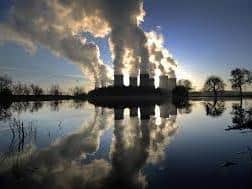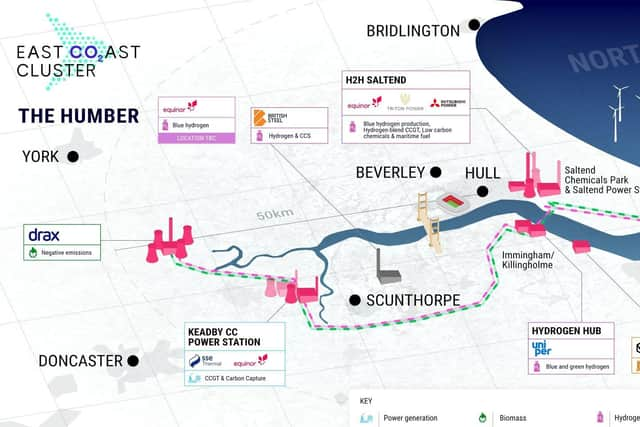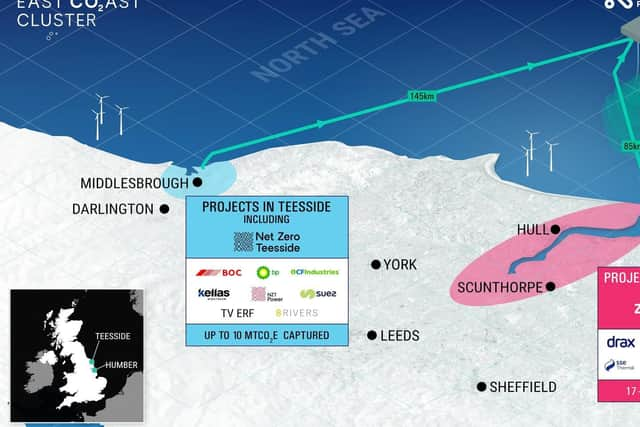Partnership calls on support to deliver 675,000 green northern jobs by 2050
The Northern Endurance Partnership (NEP) has today submitted a bid supported by major energy and industrial companies to the Department for Business, Energy & Industrial Strategy’s (BEIS) Cluster sequencing for carbon capture, usage and storage (CCUS) deployment process.
The bid is on behalf of the East Coast Cluster, a collaboration between leading companies from across the Humber and Teesside areas which aims to advance the government’s world-leading ambition to establish the first ‘net zero’ carbon industrial cluster in the UK by 2040. Taken together the two regions account for nearly 50 per cent of all UK industrial cluster emissions.
Advertisement
Hide AdAdvertisement
Hide AdThe NEP is made up of the likes of BP, Equinor, Eni, National Grid, Shell and Total form the Northern Endurance Partnership, a partnership announced in October 2020 to develop offshore carbon dioxide (CO2) transport and storage infrastructure in the UK North Sea, with bp as operator.


The infrastructure will serve the proposed Net Zero Teesside and Zero Carbon Humber projects, the latter of which includes ABP, British Steel, Centrica Storage, Drax, Equinor, Mitsubishi Power, National Grid, px Group, SSE Thermal, Triton Power, Uniper and University of Sheffield Advanced Manufacturing Centre (AMRC) as membrs.
They aim to establish decarbonised industrial clusters in Teesside and Humber and claim that if both projects fulfil their potential, NEP can enable the decarbonisation of nearly 50% of the UK’s industrial cluster emissions.
NEP is developing the common offshore infrastructure that will transport CO2 from industrial emitters in these regions, most of which are Net Zero Teesside and Zero Carbon Humber projects, to secure offshore storage in the Endurance aquifer in the Southern North Sea. Feasibility work on these projects is being co-funded by the UK’s innovation agency, Innovate UK.
Advertisement
Hide AdAdvertisement
Hide AdBy decarbonising such a substantial part of the country’s industrial heartlands, the East Coast Cluster plans to support the UK’s leadership in the energy transition and the emerging global low-carbon and hydrogen markets. The project aims to play a major role in levelling up across the country, with the potential to support an average of more than 25,000 jobs a year between 2023 and 2050.


The East Coast Cluster offers a diverse mix of low-carbon projects, including industrial carbon capture, low-carbon hydrogen production, negative emissions power, and power with carbon capture. The companies in the East Coast Cluster have extensive experience in successfully delivering ambitious and world-leading projects.
In the Queen’s Speech in May 2021, the Government emphasised the importance of levelling-up the UK’s regions. Taking the East Coast Cluster forward is an opportunity, to protect many thousands of existing jobs across Teesside and the Humber, creating thousands of new STEM-based jobs and underpinning new low carbon industries in the north of England. The East Coast Cluster aims to bring together communities, business, industry and academia to deliver the CCUS infrastructure needed to decarbonise these key industrial regions of the UK.
Andy Lane, Managing Director, NEP, said: “The UK needs to decarbonise industry to reach net zero. Nearly half of all carbon emissions from UK industrial clusters come from the Humber and Teesside, making the East Coast Cluster the single biggest opportunity to decarbonise UK industry.
Advertisement
Hide AdAdvertisement
Hide Ad“Hundreds of thousands of jobs have relied on the industries which have grown in these regions and the East Coast Cluster, by decarbonising hard-to-abate industries, aims to keep it that way, while developing a platform for UK industry to compete on a global scale.”


Grete Tveit, Senior Vice President for Low Carbon Solutions at Equinor, which is a partner of ZCH, NZT and NEP said: “Carbon capture and storage and hydrogen are both crucial technologies for reaching the goals of the Paris Agreement.
“To deliver them at scale and create real change we need collaboration like never before. And this is what we are doing with our bid to create the East Coast Cluster, working with our partners in the Humber, Teesside and the Northern Endurance Partnership. We can deliver deep decarbonisation of these major industrial regions and help the UK’s journey to net zero, safeguard jobs and develop world-leading industries.”
Beckie Hart, CBI Yorkshire & the Humber Director, said: “Decarbonising industry will be a huge challenge, but one which offers major rewards, including an opportunity to position the UK as a global leader on the path to net-zero. CCUS and hydrogen technology must play a major part if the UK is to meet its ambitious climate targets, and it is vital to accelerate delivery on these issues. Communities which get this right can benefit from new jobs and increased skills, while helping to lay the foundations for a healthier and more sustainable future.”
Comment Guidelines
National World encourages reader discussion on our stories. User feedback, insights and back-and-forth exchanges add a rich layer of context to reporting. Please review our Community Guidelines before commenting.